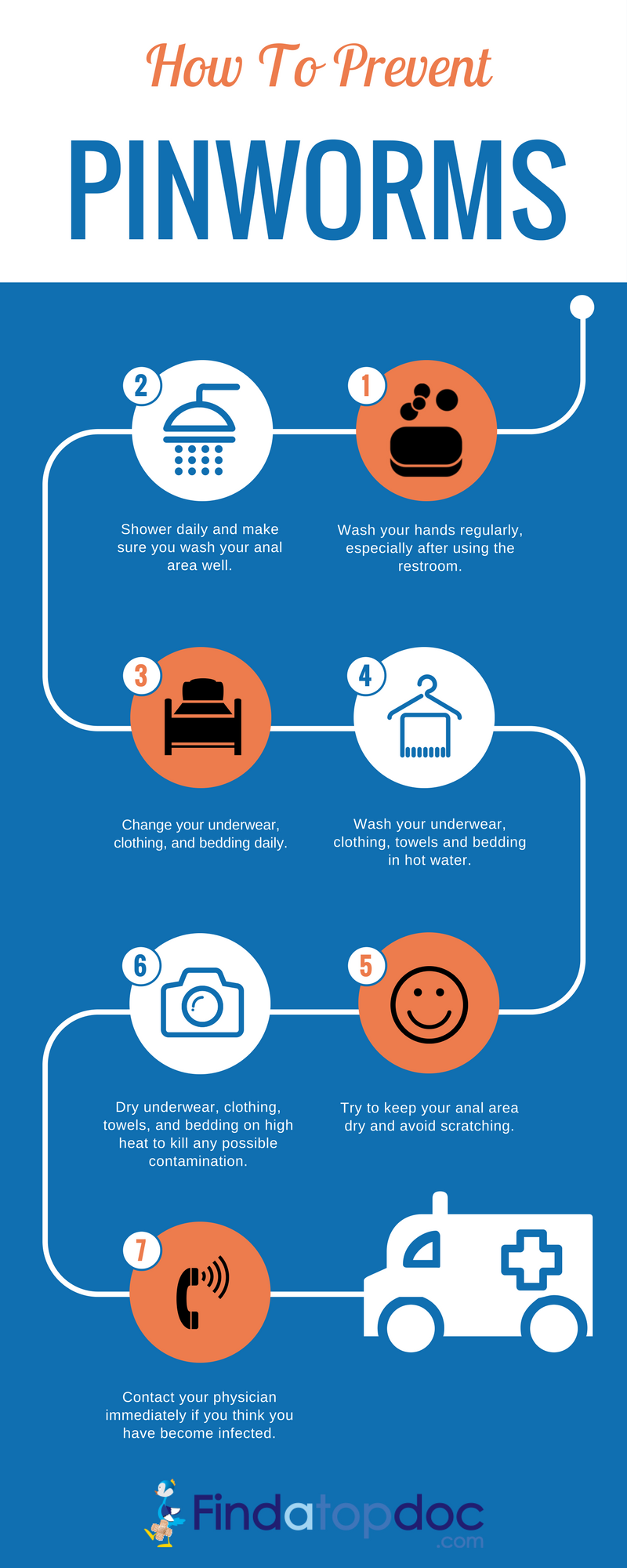What Are Pinworms? Treatment and Home Remedies for Pinworms

A pinworm infection is a parasitic infection of the intestines, mostly affecting children. Pinworms can cause great discomfort in children since the infection comes with itching and irritation in the perianal region. This parasitic infection can spread from one child to another. Even adolescents and adults can get pinworms.
What are pinworms?
Pinworms, from the name itself, are small, pin-shaped worms that affect the intestines. You can get pinworms when you swallow something that is contaminated with their eggs. Their eggs will pass through your digestive tract and hatch in the small intestine. When the worms become bigger, they move to the large intestine, where they stick to the intestinal wall.
After some time, female pinworms will leave the intestinal tract and lay their eggs around the anus, particularly when children are sleeping at night. The egg-laying process of female pinworms starts a few weeks after the ingestion of pinworm eggs.
In the US, pinworm infection is the most common parasitic infection in humans. The infection is caused by the parasite Enterobius vermicularis. Pinworms are really small about a quarter of an inch in length. A pinworm infection is called as "enterobiasis" or "oxyuriasis". Sometimes, pinworms are also called as "threadworms".
A pinworm infection can spread among family members and is quite common.
How are pinworms spread?
Pinworm eggs are spread through the fecal-oral route, which is the transmission of infective pinworm eggs from the anus to another person’s mouth. The eggs can either be passed through contaminated food, clothes, beddings, and other materials.
The eggs become infective a few hours after they are laid around the anus. They can also survive for almost a month on beddings, clothes, and other things. Moreover, pinworm eggs can sometimes be airborne—they can be ingested while breathing or inhaling.
Scratching the affected area also becomes a mode of transmission since the eggs can get under a person's fingernails, where it can survive for several hours. For this reason, regular and correct handwashing techniques must be done.
Since children have a lower immune system and have the habit of unknowingly touching things here and there, they are easily exposed to pinworm eggs and can easily get infected. Although quite uncommon, it is also possible for adults to inhale pinworm eggs while cleaning contaminated children's clothes or beddings.
Symptoms of Pinworm Infection
Some people with pinworm infection may show no symptoms at all. If people show symptoms, they are usually mild. They include:
- Itching around the perianal area, especially at night
- Stools showing the presence of pinworms
- Pain or skin irritation around the perianal area
- Feeling restless
- Females may develop a urinary tract infection (UTI)
- Insomnia due to discomfort
- Bleeding due to constant scratching (a rare symptom)
Diagnosis
If a child complains of perianal itching at night, it is strongly suggestive of a pinworm infection.
A pinworm infection can be diagnosed by detecting the worm or its eggs. Pinworms can be seen near your child’s anus and on your child’s undergarments, bed sheets, and pajamas two to three hours after your child falls asleep.
The eggs can be collected through a “tape test” as soon as your child wakes up in the morning. You can perform this test by pressing a clear adhesive cellophane tape to the area around the anus. Pinworm eggs will stick to the adhesive tape. The tape can then be put on a slide for microscopic examination.
It is important to perform the “tape test” early in the morning before your child takes a bath or have a bowel movement since washing the perianal area can remove the eggs. To effectively detect the eggs, the test must be carried out once every morning for three consecutive times.
Doing the “tape test” is very important since pinworm eggs are rarely seen in stool and urine samples.
Treatment
A pinworm infection can be treated with prescription medication or over-the-counter drugs. However, it is important to consult a doctor first before taking OTC drugs for proper diagnosis and treatment.
Treating pinworm infections involves two doses. The second dose is usually given two weeks after the initial dose. All family members of the infected individual must also be treated to avoid reinfection. Aside from treatment, people must observe strict handwashing habits and should maintain short fingernails.
Medications
The doctor would suggest antihelminthic or anti-worm medications such as albendazole, pyrantel pamoate, or mebendazole for the treatment of pinworm infections. The doctor would provide a specific dosage depending on the severity of the infestation.
For persistent irritation and itching around the perianal area, the doctor could suggest certain creams or ointments for relief.
Home Remedies for Pinworms
Medications are always the first line of treatment when it comes to treating a pinworm infection. However, there are certain home remedies that could help minimize the discomfort it causes such as itchiness and irritation of the perianal region.
One should note that what works for one person may not be the same for another person. Hence, be careful when using home remedies, especially when you have allergies.
1) Garlic
Garlic is considered as one of the most effective remedies when it comes to killing pinworms. Garlic is loaded with many vitamins and minerals such as vitamin A, vitamin C, vitamin D, vitamin B6, iron, and magnesium. Garlic is usually regarded as a medicinal herb since it can be used in treating many health conditions such as hypertension and other types of heart diseases.
Garlic prevents the female pinworms to lay any eggs and also kills the existing eggs, which are laid at the skin folds of the anal region. One can ingest garlic in small doses by chopping a clove of garlic and mix it in pasta or bread. Garlic can also be eaten in raw form. Apart from ingesting, you can also topically apply garlic in salve form.
To create a salve, chop off a few garlic cloves and make it into a fine paste. Mix this paste with a small amount of any petroleum jelly or any other oil. Take a clean cotton swab and dip it in the mixture. Apply the salve to the anal region.
Even though garlic is considered as generally safe, it can also cause side effects in certain people such as burning sensations in the mouth or stomach if they have consumed too much raw garlic. Other side effects of garlic include vomiting, nausea, and diarrhea. Too much garlic applied on the skin can also cause skin damage.
2) Dietary changes
Diet plays an important role when it comes to boosting the immune system. A healthy immune system helps the body in fighting against many infections and diseases. Thus, a body with a poor immune system would not be able to fight against any type of infection, causing many other health issues.
When it comes to pinworm infection, one should avoid the intake of sugary foods and foods rich in carbohydrates since sugar feeds pinworms. Sugary beverages and high-calorie food should also be avoided. These types of foods can help pinworms to grow and lay more eggs as well as create a favorable environment for them to thrive.
One should include foods rich in fiber such as whole wheat and raisins, which would help flush pinworms out of the system. Apart from fiber and vitamins, one can also go for probiotics, which help keep the digestive tract healthy.
Probiotics can also increase the good bacteria in the gut and help fight against bad bacteria. Yogurt is a probiotic food. However, avoid adding sugar when eating yogurt.
3) Coconut Oil
Loaded with antibacterial, antifungal, and antiviral properties, coconut oil helps clear pinworm infections if applied on a regular basis at least 3-4 times a day.
You can also swallow a teaspoon of pure coconut oil first thing in the morning or apply small amounts of coconut oil at the affected area. This should be done regularly until the infection goes away.
4) Fresh carrots
Fresh carrots during the right season can also be used as a treatment for pinworm infections. Carrots are always said to be good for the overall health of the person. Thus, including carrots in your diet provides great benefits.
Carrots are enriched with beta-carotene, which is good for the eyes. Eating carrots on a daily basis helps the body in fighting viral, bacterial, or fungal infections. Carrots are also a low-calorie food with plenty of nutrients such as vitamin A, vitamin K, vitamin C, vitamin B6, vitamin B3, vitamin B12, potassium, and magnesium.
You can shred carrots into your meal and have it at least three times a day on a regular basis. Carrots can also be eaten raw. However, if you are not a fan of raw items, you can add a little honey to the carrots to improve the taste. Carrots can also be mixed with other raw veggies in a salad.
5) Pumpkin seeds
Pumpkin seeds are used to treat parasitic infections. However, it is important to note that pumpkin seeds do not actually kill the worms, they can only paralyze the worms because they contain high levels of cucurbitin.
Blend a cup of pumpkin seeds and mix it with plain yogurt. You can also use milk or coconut water instead of yogurt. Continue adding the yogurt or coconut water until it smoothens into a fine paste.
You can directly eat this mixture as a porridge for breakfast on an empty stomach. You can also add honey, which contains antifungal and antibacterial properties. Sugar should not be added to this mixture.
6) Flaxseeds and clove
Crush cloves and mix it with the flaxseeds. Both of these ingredients have worm-fighting capabilities. You can add this mixture to any food items. Have this mixture once a day in three days to get rid of the worms.
7) Onions
Onions contain sulfur, which helps the body fight against pinworms. Slice a medium-sized onion and soak it in water overnight or for a couple of hours. You can drink the liquid thrice a day on a regular basis to get rid of the pinworms.
Prevention
Apart from medication provided by the doctor, proper hygiene and overall cleanliness must be strictly observed. The following tips would help prevent pinworm infections:
- Hands must be properly washed using warm water and soap, especially before eating.
- Always change undergarments after taking a daily bath.
- Trim fingernails from time to time to avoid the transmission of pinworm eggs.
- Avoid nail biting.
- People infected with pinworms should not scratch their perianal area to avoid the spread of infection. Apply some ointment on the affected area to provide some relief from itchiness and irritation.
- Thoroughly wash all clothes, towels, and beddings in hot water. Such items should be placed under the sun for drying to get rid of the parasites.
- Children must avoid co-bathing to avoid spreading the infection.
- All areas of the house should be vacuumed and thoroughly cleaned.
- All surfaces must be cleaned with a disinfectant. Household items should be washed before using. Toys should also be thoroughly washed before giving them to the kids. Floors, carpets, and toilet seats should also be cleaned properly.
- Wash hands before and after using the toilet. Check bowel movements for the presence of any worms.
- Wash your hands after changing a baby’s diaper. Also, look out for any presence of pinworm in the diaper.



![[Infographic] How to Prevent Pinworms?](https://www.findatopdoc.com/var/fatd/storage/images/_aliases/embedded_item/top-videos-and-slideshows/how-to-prevent-pinworms/666484-1-eng-US/How-to-Prevent-Pinworms.png)








